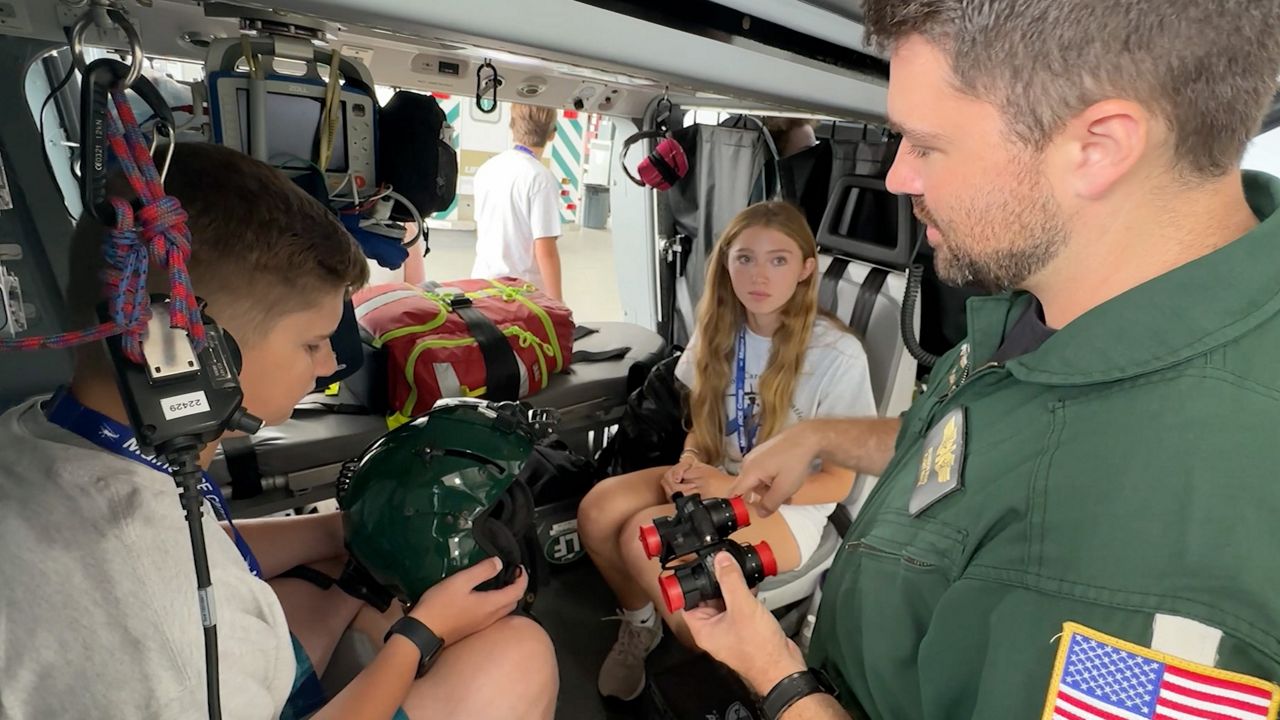Students in Sanford are getting an up-close-and-personal look at the aviation industry this week, as the annual ACE Camp kicked off on Wednesday at Sanford Airport.
Ten kids from all over Maine, ages 12 to 16, will spend four days visiting Sanford and other airports in the area, including Portland Jetport, to learn about aviation.
Tim LeSiege, the camp’s interim president, said a majority of the students express interest in becoming pilots, but the purpose of the camp is to show them as many potential career paths in the industry as possible.
“It’s not just pilots that are in aviation,” he said. “There’s pilots, mechanics, engineers, fixed-based operators, customer service jobs, computer programming, FAA, air tower control, military, so we try to introduce them to all the different avenues in aviation.”
This is the second year the ACE Camp has included Sanford. The annual camp also has another four-day camp for 12-16-year-olds at Brunswick Executive Airport, and a third, week-long overnight camp for high school students at Camp Roosevelt in Eddington.
The acronym in ACE Camp’s title stands for aviation career education. It has been operating annually in Maine alone for 29 years. Maine’s camps are part of a national collaboration between the US Federal Aviation Administration, local nonprofit partner organizations such as the United Way, and local airfields and airports such as Sanford Airport.
LeSiege said there are nearly 75 spots for students between all three camps every year, and most years all the spots are filled. According to the FAA, the goal is to bring the program to as many as 2,000 students nationwide every year.
LeSiege said inspiring young people to enter the aviation industry is crucial, citing reports from major aviation companies such as Boeing indicating a growing market of available jobs.
“There are millions of jobs that are going to be available in the very near future because our industry is really aging out,” he said. “A lot of pilots are aging out. We don’t have enough people coming in to replace those that are retiring, and we’re trying to foster all of that in pretty much every sector of the industry.”
On Wednesday, the students tried their hand at piloting miniature drones, flying them in formation and making them land on target. There was also a tour of a rescue helicopter from Lifeflight of Maine.
“It’s really cool,” said Avery Turner, 14, of Fryeburg, who got to sit in the back of the helicopter next to an empty gurney while a nurse with the company described the equipment he uses.
Gavin Dusza, 13, of Wells, said he has had an interest in aviation for years. He said he looks at public websites that track air traffic whenever he sees or hears an airplane flying overhead. He said he has seen Lifelight helicopters in the air, but never like he did on Wednesday.
“It’s nice to see it up close,” he said.
LeSiege said many camp attendees go on to careers in aviation, with some students becoming pilots in private commercial aviation and even the Maine Air National Guard.
Parker Montano, of Biddeford, is now 27 years old, but when he was 13 he attended an ACE Camp for a week, based at the time in Portland. He said he was already interested in aviation, but “there was no direction to it.”
That changed after Montano attended the camp. Since then, he has gotten his pilot’s license, and today he owns Pine Tree Helicopters, a company based at Sanford Airport that offers scenic tours, air taxi service and a full-blown flight school.
On top of that, Montano said he also volunteers for the ACE Camp and was the person who first suggested that LeSiege bring the camp to Sanford. He credits his whole career to the ACE Camp he attended 14 years ago.
“There’s a very high likelihood that I would not have ended up in aviation if it weren’t for this camp,” he said.
Fees for the camp range from $500 per week for the day camps to $1,000 for the overnight weeklong camp. LeSiege said the camp has a good track record of setting students on a path to careers in the industry, which the industry badly needs.
“Over the next five to 10 years, there’s going to be millions – not thousands – millions of jobs available for pilots and (aviation) mechanics,” he said.
Even students who don’t want to fly aircraft may want to get a license from the FAA to fly drones. Such a license, LeSiege said, is necessary even for something as simple as shooting aerial photos for real estate listings.
“It’s a huge field, and we’re always looking for more people,” he said.



